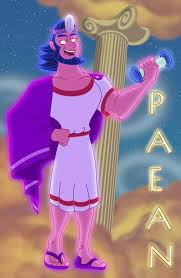
记忆方法
将“paean”拆分成“pa”和“e-an”,记住“pa”像吹响的号角声,而“e-an”可以想象成一个欢快的节奏,这样就可以在脑海中形成一个画面:吹奏欢快的号角,象征着赞美和颂扬,从而记住“paean”的意思是赞歌、颂歌。
以上内容由AI生成, 仅供参考和借鉴
中文词源
paean 赞歌,凯歌
来自拉丁语paean,赞歌,凯歌,来自希腊语paian,赞歌,献给阿波罗的颂歌,来自Paian,神医,古希腊神话众神的医生,后与阿波罗合二为一,最终来自paio,触摸,诊断。
英语词源
- paean (n.)
- 1590s, from Latin paean "hymn of deliverance," from Greek paian "hymn, chant, hymn to Apollo," from Paian, a name of the god of healing; originally the physician of the gods (in Homer), later merged with Apollo; literally "one who touches" (i.e. "one who heals by a touch"), from paio "to touch, strike."
权威例句
- 1. She struck up the first paean on the grand piano.
- 她开始在那架大钢琴上演奏起第一首颂歌。
- 2. The novel is a paean to the end of empire.
- 该小说奏响了一个帝国落寞的赞歌.
- 3. Here, deducing a paean that advances harmonious society progress.
- 这里, 正在演绎着推进和谐社会发展的一曲赞歌.
- 4. Bushes, spreading waves of insects sound, they tirelessly played with a paean to life, then!
- 草丛里传来阵阵虫鸣声, 它们在不知疲倦地上演着一曲生命的赞歌呢!